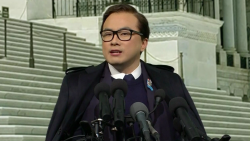Media executives are signaling that pay cuts implemented at the beginning of the pandemic are no longer enough to stave off the economic headwinds stemming from the crisis.
This week, Condé Nast and BuzzFeed became the latest media giants to announce additional belt-tighening measures as they deal with the fallout from Covid-19.
A month after CEO Roger Lynch enacted salary reductions, Condé Nast is laying off about 100 staffers in the US and furloughing about another 100. A small number of people are being put on reduced work schedules. Lynch announced the decision Wednesday in a memo to staff obtained by CNN Business.
“Since sending an update last month with our cost reduction plan for the COVID-19 crisis, our leaders and I have been working hard to turn over every stone before having to make job reductions that would impact our teams. Unfortunately, we are at a place today where we need to take additional steps,” Lynch wrote.
Many media companies have instituted pay reductions, furloughs or layoffs to make up for the lost revenue caused by the pandemic. Last month, Vox Media furloughed about 100 staffers for three months. G/O Media, whose titles include Gizmodo, Deadspin and Jezebel, laid off 14 people. Group Nine Media, which owns The Dodo and NowThis, laid off about 50 people.
Condé Nast announced its salary reduction plan on April 13. In that plan, staffers earning $100,000 or more would have their salaries reduced by 10% to 20% for five months starting May 1. Lynch said he would take a 50% reduction of his base salary. At that time, Lynch hinted at layoffs in his memo to the staff saying, “Role eliminations are never something we take lightly, and we’ll continue to work to limit this as much as possible.”
BuzzFeed — one of the first major media companies to enact a cost-cutting plan during the pandemic — is facing a similar predicament. On March 25, BuzzFeed CEO Jonah Peretti announced tiered salary reductions, which ranged from 5% to 25%, according to a memo obtained by CNN Business. Peretti also said in the memo that he would not take a salary “until we are on the other side of this crisis.”
Peretti’s intention was to save jobs, which staffers at other media companies looked to as an example of how to handle the unfolding crisis. As Vox Media management negotiated with the staff union on its own cost-cutting plan, union members proposed salary reductions. Instead, Vox Media furloughed about 100 employees for three months. Vox Media CEO Jim Bankoff said that salary reductions would not make enough of a “dent in the revenue shortfall,” according to a memo obtained by CNN Business.
But less than two months later, Peretti instituted more drastic measures for BuzzFeed. On May 6, Peretti said in a staff memo that the company was facing “even greater revenue declines than expected” and in order to keep losses under $20 million the company had to make further cuts. Peretti announced that day furloughs for 68 employees, who worked on the business side and studio team, for three months starting May 16. Peretti also said salary reductions would be extended through the end of 2020. At that time, Peretti said the company would negotiate with BuzzFeed News Guild about cost reduction for the news division.
BuzzFeed announced more cost-cutting measures at an all-hands meeting on Wednesday. Four more employees in the US will be furloughed and roughly 15 people in the UK and Australia will be furloughed, as the company is cutting back on local news coverage in those markets, according to two staffers at the meeting.
BuzzFeed management has yet to negotiate on a plan with BuzzFeed News staffers, who are unionized. Mark Schoofs, who was recently hired as the new editor in chief of BuzzFeed News, told staffers on Wednesday that management will negotiate with the union soon and that he is open to discussing a workshare program, a plan that reduces hours and pay for employees and allows them to qualify for partial unemployment benefits. Los Angeles Times union negotiated for a workshare program this month, which means staffers accepted a 20% reduction in pay.






















